
The Food and Drug Administration recently approved treatment for some patients with neuroblastoma, kidney cancer and bladder cancer. Elsewhere, a cancer vaccine made headlines for the treatment of patients with melanoma.

A nationally-published, award-winning journalist, Alex Biese joined the CURE team as an assistant managing editor in April 2023. Prior to that, Alex's work was published in outlets including the Chicago Sun-Times, MTV.com, USA TODAY and the Press of Atlantic City. Alex is a member of NLGJA: The Association of LGBTQ+ Journalists, and also performs at the Jersey Shore with the acoustic jam band Somewhat Relative.

The Food and Drug Administration recently approved treatment for some patients with neuroblastoma, kidney cancer and bladder cancer. Elsewhere, a cancer vaccine made headlines for the treatment of patients with melanoma.
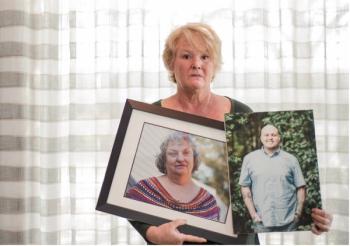
Those caring for loved ones with cancer are “at risk for becoming overwhelmed or becoming so burdened to the point of exhaustion or being sick themselves,” one expert says.
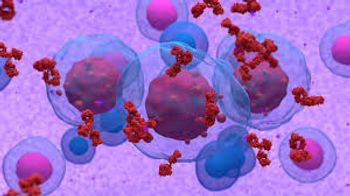
A treatment combination of Sarclisa, Kyprolis, Revlimid and dexamethasone demonstrated a complete response in patients who were newly diagnosed with multiple myeloma.

Dr. Stephanie Berg of the Dana-Farber Cancer Institute and Harvard Medical School discussed the recent EMARK trial which resulted in the FDA’s approval of Xtandi for non-metastatic castration-sensitive prostate cancer (nmCSPC) with biochemical recurrence at high risk for metastasis.

One expert explains how patients’ wishes for their end-of-life care can change with time, making those conversations with caregivers “not a one-time, sit-down discussion.”

“I have found many survivors to be very strong women who seem like they have things under control but it’s always important for family and friends to check in,” television personality, author and breast cancer survivor Giuliana Rancic told CURE.

Patients with advanced-stage melanoma continue to experience reduced risk of recurrence or death following treatment with a combination of mRNA vaccine mRNA-4157 (V940) and Keytruda, an anti-PD-1 therapy, according to recent study findings.

The Food and Drug Administration has approved Welireg for patients with advanced renal cell carcinoma, a type of kidney cancer, following treatment with a PD-1 or PD-L1 inhibitor and a VEGF-TKI.

An expert explains the significance of the recent approval of Xtandi for non-metastatic castration-sensitive prostate cancer (nmCSPC) with biochemical recurrence at high risk for metastasis (high-risk BCR) by the Food and Drug Administration.
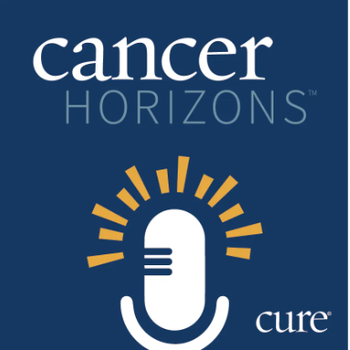
CURE® recently covered the 2023 American Society of Hematology Annual Meeting. In case you missed it, here is some news that came out of the conference that patients should know about.

Recently approved by the FDA for chronic lymphocytic leukemia (CLL) or small lymphocytic lymphoma (SLL), Jaypirca “represents a meaningful advance” in treatment, as one expert explained.

CURE® recently covered the San Antonio Breast Cancer Symposium. In case you missed it, here is some news that came out of the conference that patients should know about.

Preliminary study results examining the bispecific antibody, CDK4/6 inhibitor and hormone therapy combination in patients with advanced breast cancer were presented at SABCS.

Adding one cup of navy beans per day to patients’ diets increased beneficial bacteria in the digestive system with no side effects, according to recent study findings.

A new study aims to answer questions regarding end-of-life care for patients with stage 4 cancers and their caregivers.

From FDA concerns to a potential new drug, CAR-T cell therapies were dominating oncology headlines last week.

Cervical cancer survival and Cervivor ambassador Kate Weissman provides advice on conversations patients with cervical cancer should be having with their care teams.

Analysis of molecular subtypes of muscle-invasive bladder cancer can predict if a tumor is likely to respond to chemotherapy before surgery but is not associated with differences in survival.

Cervical cancer survivor Kate Weissman talks recent research on follow-up visits for patients after fertility-sparing surgery, and explains why it’s ‘something that the cervical cancer community is owed.’

Following promising study results, a Biologics License Application has been filed with the FDA for obe-cel (obecabtagene autoleucel), a CAR-T cell therapy for patients with relapsed/refractory (r/r) adult B-cell acute lymphoblastic leukemia (ALL).

Patients and their families facing financial burdens "don't have to try to carry the load all alone," as one ACCC Guidelines Task Force member tells CURE®.

A recent study found that healthy tissue near the sites of lung tumors may contain genetic information that could serve as a predictor of possible cancer recurrence.
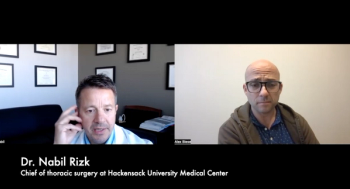
Dr. Nabil Rizk, chief of thoracic surgery at Hackensack University Medical Center, explains that segmentectomy is “just a little bit more of a refined way of treating cancers.”

Diane Messick, a three-time lung cancer survivor, tells CURE® about her cancer journey which has included a segmentectomy, a lobectomy and radiation treatment since receiving her first diagnosis in 2017.
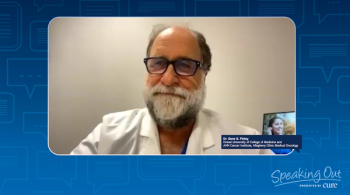
As part of its Speaking Out® video series, CURE® spoke Dr. Gene G. Finley of Drexel University of College of Medicine and AHN Cancer Institute, Allegheny Clinic Medical Oncology, about education disparities among patients with lung cancer.

As part of its Speaking Out® video series, CURE® spoke Dr. Gene G. Finley of Drexel University of College of Medicine and AHN Cancer Institute, Allegheny Clinic Medical Oncology, about advancements in treating non-small cell lung cancer and the unmet needs that persist for patients.

As part of its Speaking Out® video series, CURE® spoke with Dusty Joy Donaldson of LiveLung/The Dusty Joy Foundation and Lung Cancer Action Network about her lung cancer journey and the importance of scans.

As part of its Speaking Out® video series, CURE® spoke with Kimberly Buchmeier, a lung cancer survivor and board member of LiveLung.
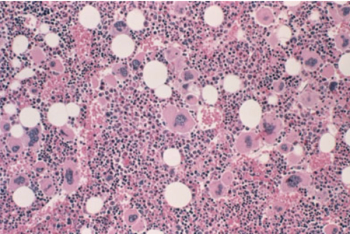
Findings of MANIFEST-2 show “valuable evidence that the addition of pelabresib offers meaningful improvements over JAK inhibitor monotherapy as a first-line approach for patients with myelofibrosis,” according to one expert.

Last week brought three more FDA approvals in the oncology space, as well as some research in neuropathy prevention and the diabetes-cancer connection.